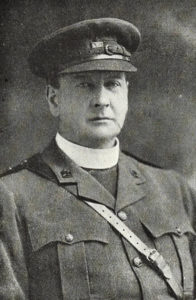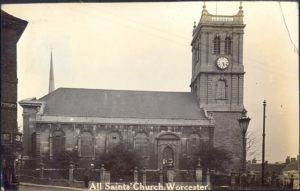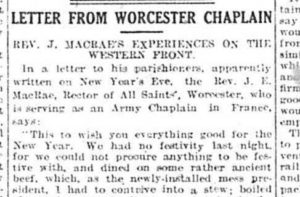Christmas in the Trenches in WWI
- 25th December 2016
Letters home give an insight into the experiences of soldiers on the front line during WWI, including reflections on Christmas in the trenches. Some such letters were written by Rev John MacRae, Rector of All Saints Worcester, who volunteered as a chaplain and wrote back to his congregation to tell them about Christmas 1915 out in France with the soldiers.
MacRae had only recently arrived, after being appointed in October. As well as leading services and supporting soldiers’ spiritual needs chaplains also chose to muck in and help in the practical tasks and carried out many of the same jobs as the soldiers. This included helping to build shelters, cooking, and transporting supplies. Being with the soldiers in the trenches meant they were exposed to many of the same risks from shellfire and snipers, and exposed to many health risks, and a number of chaplains died during the war.
At Christmas MacRae led two services for the men, adapting to what conditions he could find. One was held in a barn for his own Company, and he then carried out another in an orchard for another group. He would have liked to have led more for other soldiers but could not find the transport to travel further afield.
MacRae was elected mess president, and tried to obtain geese or turkeys for Christmas dinner, although when they arrived they were rather small and insufficient to feed a group of hungry men. However, they managed to get a pig too to help feed everyone. Cooking in these primitive conditions must have been a challenge.
Presents from home were always important to soldiers, particularly at Christmas time. At All Saints they were working hard to support the troops and over Christmas MacRae received a parcel containing 26 pairs of socks, 8 pairs of mittens and cuffs, and 17 mufflers to distribute, plus a body belt for their Rector. 20,000 cigarettes arrived shortly after too.
Weather conditions were also hard, and MacRae related the problem all soldiers suffered from, which was being wet most of the time with little opportunity to dry themselves or clothes once they got wet.
We know from the Museum of Army Chaplaincy that MacRae was interviewed for the role in September 1915 and appointed Temporary Chaplain to the Forces 4th Class on 18 October 1915. The interview cards have been digitised by the Museum, and included is information that he passed his medical, could ride a horse, lived at 104 Bath Road, was married with 2 children, would be free in two weeks, and had references from the Bishop and Dean of Worcester.
The Museum also holds the personal notebook of the Rev Harry Blackburne DSO who was the Assistant Chaplain General to the 1st Army. He records his impressions of the Anglican chaplains who served with him in 1st Army. The entry for Rev J E Macrae reads:
MACRAE J E – 19th Division.
A large man with a strong personality.
Rev John MacRae left the army on 23 October 1916 and returned to All Saints, Worcester. In late 1919 he chaired the first few meetings of the parish War Memorial Committee before leaving to return to his native Scotland.
You can read more about the role of chaplains in WWI on the BBC website here. You can also search for records of other chaplains at the Chaplains Museum site.
Letter from Worcester Chaplain
Rev.J Macrae’s experiences on the Western Front [published Worcester Herald 16 Jan 1916]
In a letter to his parishioners, apparently written on Ne Year’s Eve, the Rev. J.E.MacRae, Rector of All Saint’s, Worcester, who is serving as an Army Chaplain in France, says,
“This is to wish you everything good for the New Year. We had no festivity last night for we could not procure anything to be festive with, and dined on some rather ancient beef, which as the newly installed mess president, I had to contrive into a stew: boiled rice and a pound of prunes completed the modest meal. Afterwards we visited the sergeants mess – to wit twelve of them in a wash-house behind the farm: planks on boxes for a table, candles stuck in bottles et tout cela. Fortunately, we had procured a turkey for them: they supplied at 9pm. We made cheerful speeches and hoped all would be ended before another twelvemonth: then to bed, expecting the guns, which had been silent most of the afternoon, to salute the New Year. They didn’t, and the night passed without a shot, so far as we could hear, for the wind was from the north.”
In another passage, relating to the obtainment of supplies, Mr MacRae says, the 22 geese we ordered from E Force canteen could not be got: so I was promised turkeys instead. Last night S came back with turkeys, small birds only 8lbs each – no good – so we sent him to buy a pig as well for our men’s Christmas dinner. Tonight we have found a large oven, and the ‘grub’ and beer will be consumed in the barns in their groups – a rough and not very ready picnic, but the best we can do.
“I wonder if people at home can picture the condition under which we actually live here? The newspapers, one and all, have told such tales of marvellous organisation, comfort in abundance, and so forth, that the real facts of crowding in barns – lucky if straw if handy – and everything being done in field and orchard, with the roughest food that a man can eat and keep healthy, are lost sight of. The men go for a fortnight or more without taking clothes off, day or night, till somehow, when in reserve, getting in one of the wash-houses some miles distant. Can anyone at home picture what this means in winter time? When we get wet – and that’s often – nothing can be dried, and we just go on and hope for a little sunshine in the course of a week.
“January 4th – We shifted down here yesterday again into huts and the mud. These shifts are days of strenuous toil for each and all – pack, lift, sit down, and rearrange everything – a job that cannot be completed in daylight anyhow. A scrimmage for food, tumble in as best we can, and on the morrow try to contrive means of existence for unknown days ahead of us. My job as chaplain, of course, has to go on one side for a day or two, and I help to get our men’s various necessary affairs along, that we may live. Today I cut drains all around our hut, and built a brick and mud Kitchener for rough cooking, as our stove is worn out.
“Yesterday, by a great stroke of luck, my parcels at last arrived. W’s box is A1. A parcel of comforts too, from ladies of All Saints Parish came – quite an unexpected boon. Tell them (I will write also) that, for men just out of the trenches, socks, etc, are an absolute Godsend. Those sent will be given to Worcester men. I had also 20,000 cigarettes from L.I.S’s sister. It was a lucky day for me. We got all our belongings in dry – a blessing only those who live in the open will appreciate.
“On Sunday I had two very interesting services. One for a company from the other battalion of our diocese, in an orchard behind a shattered church; the other in a barn for our company. Christmas hymns – as we stood round as best we could, crowded together. The French women of the farm peeped across their yard, and seemed impressed with our singing, which was certainly very effective. Had my horse been available I would have had two more services.
“You do not seem to have had all my letters. Can the Censor have been busy. I also sent a dozen others to people in Worcester. I am quite fit and well”.
 Rev Rich Johnson, All Saints Worcester
Rev Rich Johnson, All Saints Worcester
We showed the letter to John’s present day successor at All Saints, Rev Dr Rich Johnson, to see what he thought of MacRae’s experiences. He said:
“This wonderful story of the life and service of one of my predecessors makes me wonder what I would have done in his place. This story is a reminder that the church exists to make a difference in the mess and pain of our broken world. The message of Jesus does not offer us an escape from the world or some nice ideas which to deny the reality of it, but rather calls us to wade in deep and bring hope and love, both with our words and our actions. The Rev John MacRae exemplified this, leaving behind the relative security and comfort of life in Worcester, to serve those serving on the frontline. That is in fact, the call on the whole church; to put the needs of others before our own. The example and inspiration of my predecessor lives on in the parish of All Saints to this day, for instance, as we partner with others to run Worcester Foodbank, a debt centre and help find homes for children in care.”


